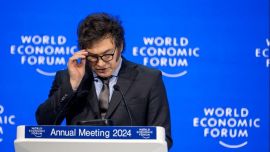Argentina announced on Wednesday that it will leave the World Health Organization as President Javier Milei seeks to align his policies with those of Donald Trump in the United States.
Milei's chief spokesman Manuel Adorni cited “deep differences” between Milei’s government and the WHO on health policy, including the recommendations during the Covid-19 pandemic. Argentine newspaper La Nación first reported the decision, noting Milei would sign a decree to make the move official.
“Argentines aren’t going to allow international organisations to intervene in our sovereignty, and much less so in our health,” Adorni told reporters at the Casa Rosada in Buenos Aires.
The move mirrors Trump’s exit last month from the WHO, an organisation that is responsible for helping to coordinate the response to global health threats including ongoing outbreaks of Ebola and mpox. It provides guidance to countries on health matters, with staff working around the globe.
The United States is the WHO’s top donor, with its planned exit leaving a gaping hole in already constrained finances. The US has accused the WHO of deferring too much to the Chinese government in the early days of the coronavirus outbreak. It’s also taken issue with what it claims are unfairly onerous payments. The exit has been widely criticised by scientists and global health experts who fear that it leaves both the US and the rest of the world less prepared for health crises.
Argentina’s exit from the WHO is unlikely to impact the institution as the country only contributed US$8.3 million in the period 2024-25, a tiny fraction of more than US$6.9 billion it expects to collect from donors and members. But it will leave Argentina without access to key meetings and data that the WHO shares with member countries on diseases and public health.
Like Trump, tensions between Milei’s government and WHO officials had already flared when Argentine leaders stated that they would not adhere to an agreement being negotiated between WHO countries on how to respond to pandemics. The treaty aims to ensure that all countries in the world are better prepared for future health crises, such as the Covid-19 pandemic.
related news
by Ignacio Olivera Doll & Ashleigh Furlong, Bloomberg






















Comments